Accelerate > Publications
Search this online library featuring the latest FAO publications, issue papers and briefs which offer up-to-date knowledge and innovative insights for SDG acceleration.
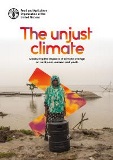
The unjust climate: Measuring the impacts of climate change on rural poor, women and youth
2024
This report assembles an impressive set of data from 24 low- and middle-income countries in five world regions to measure the effects of climate change on rural women, youths and people living in poverty. It analyses socioeconomic data collected from 109 341 rural households (representing over 950 million rural people) in these 24 countries. These data are combined in both space and time with 70 years of georeferenced data on daily precipitation and temperatures.
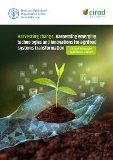
Harvesting change: Harnessing emerging technologies and innovations for agrifood system transformation - Global foresight synthesis report
2023
This study assesses a selection of technologies and innovations, which potentially could be of paramount importance in addressing agrifood challenges until 2050, as well as the most important trends and drivers that will influence the emergence of agrifood technologies and innovations and their triggers of change, including some regional aspects.
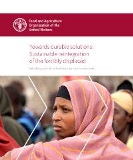
Towards durable solutions: Sustainable reintegration of the forcibly displaced
2023
This brochure provides an overview of FAO’s approach to supporting the sustainable reintegration of the forcibly displaced. It is part of a series of briefs on durable solutions, which highlight key approaches to forced displacement programming and policy, including tailored approaches to partnerships, data and evidence, with a view to achieving durable solutions to forced displacement including when conditions allow for a safe and dignified return.
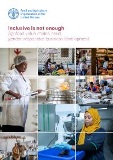
Inclusive is not enough – Agrifood value chains need gender-responsive business development
2023
This brief, jointly developed by the FAO Regional Office for Africa and the FAO Regional Office for the Near East and North Africa, aims to trigger a critical reflection on the concept of “inclusive” agribusiness and propose a new definition that highlights the importance of considering gender equality and women’s empowerment as an integral component of agribusiness development.
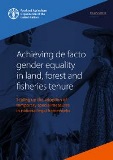
Achieving de facto gender equality in land, forest and fisheries tenure - Scaling up the adoption of temporary special measures in national legal frameworks
2022
This legal paper first considers the obligations of states in relation to gender equality and the adoption of temporary special measures, and the work of the Convention on the Elimination of All Forms of Discrimination Against Women (CEDAW) Committee in clarifying and expanding the concept of temporary special measures.
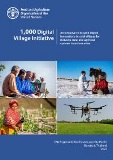
1,000 Digital Village Initiative - An initiative to expand digital innovations in rural villages for inclusive rural and agrifood systems transformation
2022
This report introduces the FAO Digital Village Initiative, which aims to facilitate through knowledge and information. It approaches countries and communities to develop, accelerate and deploy digital technologies in rural villages and communities. The report introduces the Digital Village Ecosystem approach. It describes an instrument (tool) to gather information and provide a village ecosystem assessment to help generate recommendations for future interventions to deploy beneficial, ...

Labelling and certification schemes for Indigenous Peoples' foods
2022
This review, for the first time to date, analyses the potential of labelling and certification schemes for Indigenous Peoples to market their food products. Specifically, it looks at those schemes that are designed by, with and for Indigenous Peoples, and that can provide economic, social and environmental benefits while protecting and promoting their unique values centered around the respect of life and Mother Earth.
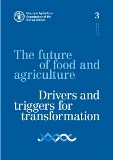
The future of food and agriculture – Drivers and triggers for transformation
2022
This report aims at inspiring strategic thinking and actions to transform agrifood systems towards a sustainable, resilient and inclusive future, by building on both previous reports in the same series as well as on a comprehensive corporate strategic foresight exercise that also nurtured FAO Strategic Framework 2022–31. It analyses major drivers of agrifood systems and explores how their trends could determine alternative futures of agrifood, socioeconomic and environmental systems.
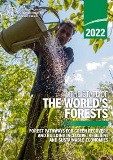
The State of the World’s Forests 2022 - Forest pathways for green recovery and building inclusive, resilient and sustainable economies
2022
Against the backdrop of the Glasgow Leaders’ Declaration on Forests and Land Use and the pledge of 140 countries to eliminate forest loss by 2030 and to support restoration and sustainable forestry, the 2022 edition of The State of the World’s Forests (SOFO) explores the potential of three forest pathways for achieving green recovery and tackling multidimensional planetary crises, including climate change and biodiversity loss...
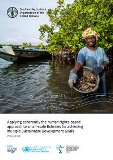
Applying coherently the human rights framework to small-scale fisheries for achieving multiple Sustainable Development Goals
2022
In the context of the International Year of Artisanal Fisheries and Aquaculture 2022, FAO, the Office of the High Commissioner for Human Rights (OHCHR) and the collaborative research initiative One Ocean Hub have been collaborating to raise awareness of the full scope of the human rights framework applicable to small-scale fisheries. This policy brief aims to clarify the scope of the international human rights framework, including the corresponding State obligations...

Indigenous Peoples’ food systems: Insights on sustainability and resilience from the front line of climate change
2022
This publication provides an overview of the common and unique sustainability elements of Indigenous Peoples' food systems, in terms of natural resource management, access to the market, diet diversity, indigenous peoples’ governance systems, and links to traditional knowledge and indigenous languages. While enhancing the learning on Indigenous Peoples food systems,...
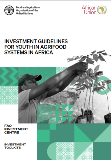
Investment guidelines for youth in agrifood systems in Africa
2022
The Investment guidelines for youth in agrifood systems in Africa, developed jointly by FAO and the African Union Commission (AUC) through a multi-stakeholder and participatory process, highlight the importance of youth as change agents and key stakeholders contributing to sustainable agrifood systems. The guidelines aim to accelerate investments in and by youth in agrifood systems by providing practical guidance - including tools and examples ...
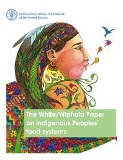
The White/Wiphala Paper on Indigenous Peoples' food systems
2021
This White/Wiphala paper on Indigenous Peoples’ food systems is the result of collective work by Indigenous Peoples’ representatives and experts, scientists, researchers, and UN staff. Over 47 different units, organizations, and institutions have contributed to the Paper from the seven socio-cultural regions.
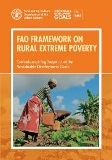
FAO framework on rural extreme poverty: Towards reaching Target 1.1 of the Sustainable Development Goals
2019
FAO has established a Corporate Framework on Rural Extreme Poverty to orient and bring to bear the relevant work of the Organization towards reaching Target 1.1 of the SDGs. Eliminating extreme poverty is directly linked to eliminating hunger (SDG 2), as well as other SDGs. When the extreme poor have means to a better life, they no longer suffer from hunger and can invest in a better future for their families and communities
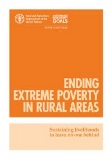
Ending extreme poverty in rural areas - Sustaining livelihoods to leave no one behind
2018
Sustainable Development Goal 1, ending poverty in all its forms, everywhere, is the most ambitious goal set by the 2030 Agenda. This Goal includes eradicating extreme poverty in the next 12 years, which will require more focused actions in addition to broad-based interventions. The question is: How can we achieve target 1.1 and overcome the many challenges that lie ahead?
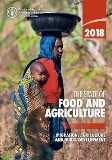
The State of Food and Agriculture 2018 - Migration, agriculture and rural development
2018
Migration is an expanding global reality, one that allows millions of people to seek new opportunities. But it also involves challenges for migrants and for societies, both in areas of origin and of destination. This report analyses migratory flows – internal and international – and how they are linked to processes of economic development, demographic change, and natural-resource pressure.
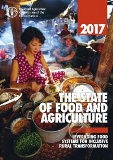
The State of Food and Agriculture 2017 - Leveraging food systems for inclusive rural transformation
2017
One of the greatest challenges today is to end hunger and poverty while making agriculture and food systems sustainable. The challenge is daunting because of continued population growth, profound changes in food demand, and the threat of mass migration of rural youth in search of a better life. This report presents strategies that can leverage the potential of food systems to become the engine of inclusive economic development and rural prosperity in low-income countries.
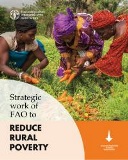
Strategic work of FAO to reduce rural poverty
2017
FAO helps countries achieve SDG1 (No poverty) and SDG2 (Zero hunger) by improving the livelihoods of poor and extreme poor rural people, including smallholders and family farmers.
Browse by SDG
- SDG1: No Poverty
- SDG2: Zero Hunger
- SDG3: Good Health & Well-being
- SDG4: Quality Education
- SDG5: Gender Equality
- SDG6: Clean Water & Sanitation
- SDG7: Affordable and Clean Energy
- SDG8: Decent Work and Economic Growth
- SDG9: Industry, Innovation and Infrastructure
- SDG10: Reduced Inequalities
- SDG11: Sustainable Cities and Communities
- SDG12: Responsible Consumption and Production
- SDG13: Climate Action
- SDG14: Life Below Water
- SDG15: Life on Land
- SDG16: Peace, Justice and Strong Institutions
- SDG17: Partnerships for the Goals
Browse by Better
Browse by Priority Area
- Innovation for Sustainable Agriculture Production
- Blue Transformation
- One Health
- Small-Scale Producers' Equitable Access to Resources
- Digital Agriculture
- Healthy Diets for All
- Nutrition for the Most Vulnerable
- Safe Food for Everyone
- Reducing Food Loss and Waste
- Transparent Markets and Trade
- Climate Change Mitigating and Adapted Agrifood Systems
- Bioeconomy for Sustainable Food and Agriculture
- Biodiversity and Ecosystem Services for Food and Agriculture
- Achieving Sustainable Urban Food Systems
- Gender Equality and Rural Women's Empowerment
- Inclusive Rural Transformation
- Agriculture and Food Emergencies
- Resilient Agrifood Systems
- Hand-in-Hand Initiative
- Scaling up Investment
